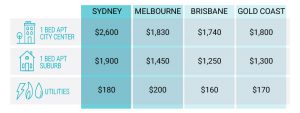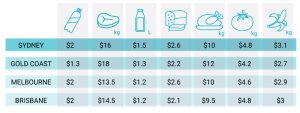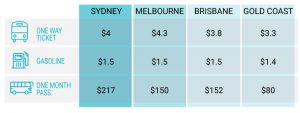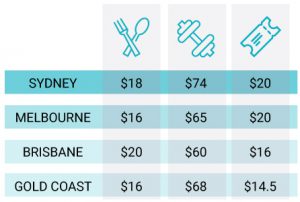Groceries, rent and other expenses per city
One of the first questions we receive from our students is about what is the average cost of living in Australia. As you may have heard, Australia is a costly country to live in, but at the same time, it has well working hourly pay that allows you to make a living. So, even working your 20hs per week as a student you will get the necessary to pay for your expenses. In this article, we will show you the cost of living comparison of the main cities our students choose to go: Sydney, Melbourne, Gold Coast and Brisbane.
Remember that in order to receive a Student Visa, the Australian government requires you to prove funds of AU$20,290 for 12 months of living.
According to the Australian Fair Work Commission, the national minimum wage is currently AU$18.93 per hour. The Student Visa allows you to legally work up to 20 hours per week, with the possibility to make an average of AU$350 a week. However whether or not this amount will be sufficient to pay your bills, will depend on your everyday costs of food, rent, transportation and leisure.
The average cost varies from city to city, so we recommend to make a budget for your main costs and save a fixed amount to spend in the first months of arriving in Australia.
Expatistan is a platform that calculates the cost of living for any city in the world. It has ranked the main cities in Australia, from the most expensive to the least, and is a good reference to determine the city that is the right match for your budget:
1.Sydney
2.Melbourne
3.Darwin
4.Canberra
5.Brisbane
6.Gold Coast
7.Adelaide
8.Cairns
9.Newcastle
10.Perth
Numbeo and Study in Australia provide the ‘basic costs of living’ per city to help you plan ahead.
1.House Rental
As soon as you arrive in Australia you will notice that everything is measured in weeks. This means that in general, you will receive your wages weekly and even pay your rent every week. Also, be aware that usually when you choose an accommodation the owner will ask you for a bond in advance, which represents between 2 to 4 weeks of your rent. After you leave the accommodation, you should immediately receive this money back.
In the following graph, we have approach how much should cost you a private monthly flat rent in the main 4 cities that our students choose to live. The prices usually change if you decide to live near the city or in a suburb.

Most of our students decide other types of accommodation, usually sharing with other students or travellers. if you are planning to stay in an alternative and shared types of accommodation, the average national costs are listed below:
Hostels and Guesthouses: $90 to $150 per week
Shared flat: $85 to $215 per week
On campus: $90 to $280 per week
Homestay: $235 to $325 per week
Source: studyinaustralia.gov.au, Nov 2018
These options are the best if you are looking to make some friends, getting to know people from all over the world, and also start putting your English in practice!
We also recommend you search for accommodation at Gumtree and Airbnb especially for those first few weeks in Australia.
2.Groceries
The costs of groceries and food will vary between the supermarket chains in Australia.
The most popular supermarkets are Aldi, Woolworths and Coles; the more exclusive and expensive are IGA and Harris Farm.

We estimate the average cost per week with food, per person as AU$50, having a healthy and balanced diet.
3.Transport
Every city has its own public transport pass: Opal Card (Sydney), Myki (Melbourne), Translink (Brisbane and Gold Coast).
Depending on how many times you use public transport per week, you may be entitled to some discounts or benefits.

Good alternatives for saving money and contributing to the environment is to ride a bicycle or walk where possible. Also, each city has special days or journeys where the price of public transport is very cheap or even free. For example, on Sundays in Sydney, your Opal Card won’t charge you more than AU$2.50, even if you travel far away. Melbourne also has the Free Tram Zone in the city centre with free rides every day during the week.
4.Leisure
Australia is very proud of its culinary culture which is inspired by all countries across the globe. There are options to suit all kinds of budgets from local pubs, to ‘cheap eats’, Asian inspired restaurants to fine dining. The costs of dining out will vary from city to city. Below we have listed the average price of leisure activities based on popular and mainstream pricing.

5.Mobile Phone
There are lots of companies to choose from, and this will depend on the city you choose to live. The most well known are Vodafone, Optus and Telstra. In general, an average monthly phone costs around AU$40, having at least 3GB of data and free Calls and Text Messages.
Do you agree with this price budgets or how was your experience? Please comment us below with your thoughts! Also, remember to check our article about Useful Apps to download before you arrive in Australia, with apps about searching Accommodation, manage your Public Transport, and much more tips that will also help you choose the best way to plan your budget.
Still have doubts about costs? Leave us a comment down below.
If you find this article helpful, please remember to share it with your friends 🙂
Planning to go study in Australia? Don’t hesitate to send us a message at info@puravidastudy.com.au, we are more than happy to give you advise with the best type of visa, city or courses options.
See you mate!


